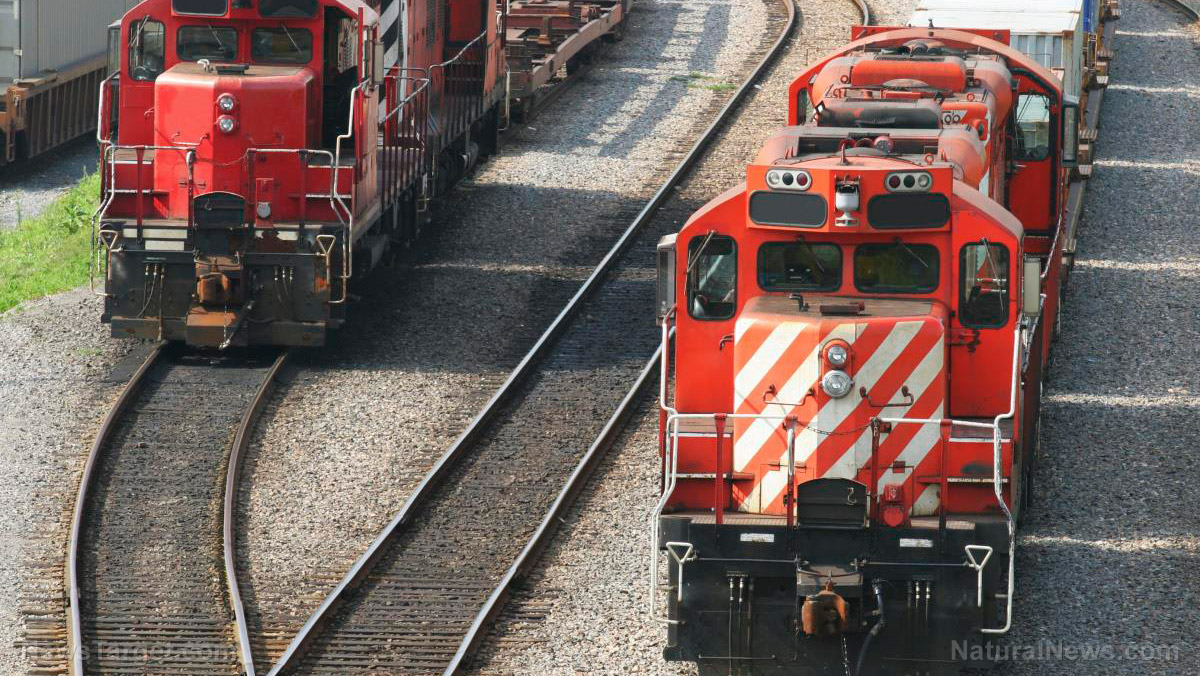Supply collapse: America just days away from total rail shutdown as nationwide strike looms
09/14/2022 / By Ethan Huff

By the end of the week (around September 18), more than 100,000 railroad workers across America are slated to walk off the job as part of a nationwide freight-rail strike that has been brewing for several months now.
Officials from the Biden regime are reportedly in talks right now with others in the transportation industry, including truckers, shippers and air freight, to forge “contingency plans” for when the rail shutdown inevitably materializes. Loss of rail service will deliver a massive blow to an already fragile and failing supply chain, we are told, and Biden’s people have been tasked with developing a solution.
Nearly 30 percent of all United States freight moves via rail, the latest data shows. Half of that is bulk commodities such as energy, food, chemicals, metals and wood products, while the other half is shipping containers full of consumer goods.
If the strike ensues as planned, the U.S. economy will lose $2 billion per day in supply chain disruptions. This will be an absolute disaster for Joe Biden and other Democrats who are vying to keep their party in power this November.
Will Biden fulfill his promise of being the most “pro-union” president in history?
We are told that most of the railroad unions involved in contract disputes have either already reached agreements or are on the verge of doing so as of September 12. Two unions representing more than 100,000 workers, however, have not and are prepared to strike as soon as Friday, September 16 unless an agreement can be made before the deadline.
At the heart of the dispute is the unions’ demand that workers be allowed to take unpaid time off for doctors’ appointments without being penalized. Rail lines do not want to allow that while workers say it needs to be part of their contracts if they are to continue working past Friday.
It is now or never for Joe Biden to keep the rail lines running, which he promised to do when he dubbed himself the most pro-union president in American history. If talks sour and workers walk off the job this Friday, then Biden will have made an even bigger fool of himself than he already has.
“Most of the 12 railroad unions have reached or finalized tentative agreements with BNSF Railway, CSX Corp., Kansas City Southern, Norfolk Southern Corp., and Union Pacific Corp. via collective bargaining,” one report explains.
“Two unions, the Brotherhood of Locomotive Engineers and Trainmen and the International Association of Sheet Metal Air, Rail and Transportation Workers, accounting for more than 100,000 workers, are still holding out while negotiating.”
Amtrak has already issued a warning to passengers that travel interruptions have already begun as three long-distance routes have been removed from its train schedule.
“To avoid possible passenger disruptions while on route … these adjustments are necessary to ensure trains can reach their terminals prior to freight railroad service interruption if a resolution in negotiations is not reached,” Amtrak said in a statement.
The Association of American Railroads also issued a warning that a freight rail shutdown could “devastate” Amtrak’s operations, resulting in tens of thousands of – if not more – daily commuters no longer being able to get to work.
“Coal would stop,” added Ernie Thrasher, CEO of Xcoal Energy & Resources LLC, the biggest U.S. exporter of coal. “No coal is going to move until these guys go back to work.”
Other products that will no longer move include corn, wheat, soybeans and other soy-based products, lumber, corn syrup, liquor, animal feed and various other grains and foods.
As the global supply chain disintegrates, we will keep you up to date with the latest at Collapse.news.
Sources for this article include:
Submit a correction >>
Tagged Under:
collapse, economy, labor, rail, rationing, scarcity, shutdown, strike, supply chain, union
This article may contain statements that reflect the opinion of the author
RECENT NEWS & ARTICLES
COPYRIGHT © 2022 EnergySupply.news
All content posted on this site is protected under Free Speech. EnergySupply.news is not responsible for content written by contributing authors. The information on this site is provided for educational and entertainment purposes only. It is not intended as a substitute for professional advice of any kind. EnergySupply.news assumes no responsibility for the use or misuse of this material. All trademarks, registered trademarks and service marks mentioned on this site are the property of their respective owners.



















